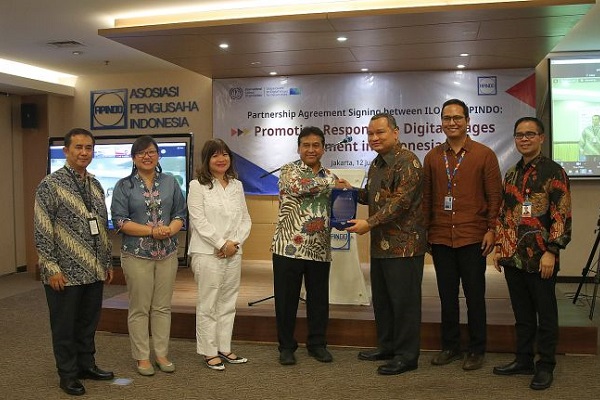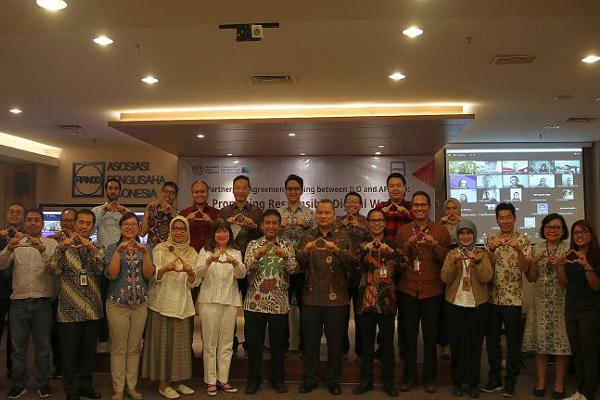Contact us: digitalwages@ilo.org
ILO and APINDO sign a partnership agreement to promote responsible digital wage payments in Indonesia

The ILO and APINDO join forces to promote the transition from cash to responsible digital wage payments by signing a Collaboration Agreement. This will enable Indonesian workers to have better control over their wages and benefits.
The collaboration focuses on three key areas to accelerate the transition to responsible digital wage payments in Indonesia: 1. Build evidence and raise profile of responsible digital wage payments; 2. Raise awareness of SMEs on the benefits of digital wage payments and build their capacities to transition to responsible digital wage payments; 3. Strengthen small entrepreneurs and workers’ financial literacy to facilitate adoption of digital wage payments. The collaboration also upholds the main characteristics of responsible digital wage payments: Fair opportunities and treatment for all workers, choice in payment methods, accessibility and security of the wages and assets, transparency and privacy and enabling condition such as infrastructure readiness.
“We uphold the principle of ‘no-one left behind’. It means that no worker is left behind in digitization upskilling, no company is left behind in back office digitization and no one is left behind in digital financial transformation. It is a daunting task, but through a multi-stakeholder collaboration, we believe we can achieve this.”
– Hariyadi Sukamdani, Chairperson of Apindo
Hariyadi Sukamdani, Chairperson of APINDO, stated that APINDO has paid a serious attention to the development of small- and medium-sized enterprises in Indonesia, especially those led by women entrepreneurs. APINDO has established a SME Academy, accommodating 140.000 SMEs and more than 100 communities of SMEs from various sectors in the country.
“APINDO continues to explore ways to empower workers to have a better understanding about financial inclusion and to better implement financial management at both personal and company levels. We uphold the principle of ‘no-one left behind’,” stated Hariyadi. “It means that no worker is left behind in digitization upskilling, no company is left behind in back office digitization and no one is left behind in digital financial transformation. It is a daunting task, but through a multi-stakeholder collaboration, we believe we can achieve this.”
Hariyadi also highlighted the crucial role of wage digitization in improving workers’ financial wellbeing. Meanwhile for digital financial service providers, wage digitization would expedite the creation of better offerings, risk management and pricing as well as a just financial inclusion framework. “Thus, we actively work together with development partners such as the ILO and we hope this collaboration can be implemented in a way that brings resilience and growth to both employers and employees,” he concluded.
“The initiative can accelerate the possibility of encouraging the formalization of the informal economy, contribute to improving SMEs business performance and increase workers’ financial inclusion.”
– Michiko Miyamoto, ILO Country Director for Indonesia and Timor-Leste
Michiko Miyamoto, ILO Country Director for Indonesia and Timor-Leste, appraised the important role of APINDO in encouraging and motivating enterprises to smoothly transition to responsible digital wage payments. She also hoped that the collaboration would contribute to the acceleration of the digital transformation of payments in the country and the advancement of fair and decent wages that will not only benefit workers and enterprises, but also the government and society at large.
“The initiative can accelerate the possibility of encouraging the formalization of the informal economy, contribute to improving SMEs business performance and increase workers’ financial inclusion,” she added.

The signing of the collaboration was witnessed by Shinta Widjaja Kamdani. Vice Chairperson of APINDO, Ronald Walla, Chair of APINDO for SMEs as well as representatives from the Coordinating Ministry for Economic Affairs, Ministry of National Development Planning (Bappenas), Ministry of Cooperatives and SMEs, Bank of Indonesia, the Financial Services Authority (OJK), Indonesia Payment System Association, development partners and academia.
The support of the ILO is given through its Responsible Digital Wage Payments Project in Indonesia. With a focus on gender equality, the project seeks to promote the financial inclusion and literacy of workers and to enable enterprises in various economic sectors to better respect workers’ rights and formalize employment, to become more productive and to grow.
